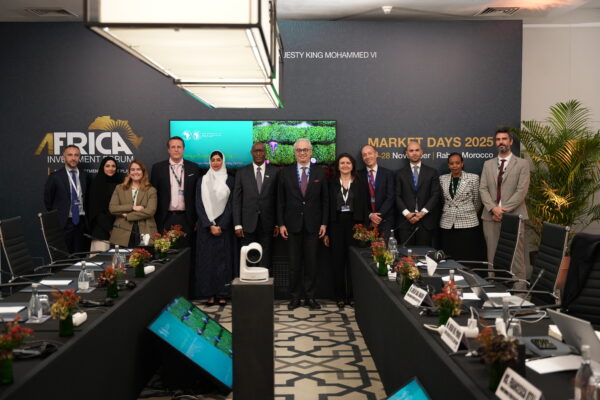The Rome Process/Mattei Plan Financing Facility (RPFF) Governing Council convened for its first-ever in-person meeting in Rabat, Morocco, on the margins of the Africa Investment Forum (AIF).
The Governing Council approved the RPFF’s 2026 work plan, which targets commitments of close to €100 million. These resources are expected to leverage more than €550 million in co-financing from the African Development Bank’s ordinary resources. The investments will advance inclusive growth, enhance essential service delivery, build climate resilience, and address the root causes of irregular migration.
This meeting marks an important milestone for the RPFF, which was approved by the African Development Bank Board of Governors in February 2025. Dr Kevin K. Kariuki, Vice President, Power, Energy, Climate and Green Growth, underscored RPFF’s critical importance, noting that it is truly vital in addressing Africa’s profound and interconnected challenges. It mobilises and channels resources into strategic investments in the energy, transport, and water sectors through co-financing—via concessional loans or grants—of African Development Bank projects, as well as through the provision of technical assistance.The RPFF, with an initial capitalisation of €158 million, is supported by its founding partners: Italy and the United Arab Emirates (UAE).
“Italy is profoundly committed to cultivating a new era of partnership with African nations, as envisioned by the Mattei Plan. The RPFF is a cornerstone of this commitment, translating shared goals into tangible projects that will empower communities, drive economic growth, and enhance climate resilience,” said Lorenzo Ortona, Representative for Italy at the RPFF Governing Council. “The approval of this ambitious 2026 Work Plan underscores our collective resolve to accelerate sustainable development and address pressing challenges across the continent.”
“The UAE firmly believes in the power of global collaboration to achieve sustainable development and address climate change,” said Sarah Jasim, Director of Sustainable Development Department at the UAE Aid Agency and Representative for the UAE at the RPFF Governing Council. “Our support for the RPFF reflects our dedication to empowering African nations with the resources needed to build resilient infrastructure, create opportunities, and improve the lives of their citizens. We look forward to witnessing the transformative impact of the projects outlined in the 2026 Annual Work Plan.”
In the first few months of operation, the RPFF has already approved two projects that demonstrate its immediate commitment to on-the-ground impact. The Eastern Region Agricultural Value Chain Development Project (ERAVCDP) in Angola is a €17 million concessional loan contribution to a €183 million project that aims to enhance agricultural processing and value chain development, strengthening regional food security and economic opportunities. The Borana Resilient Water Development for Improved Livelihoods Program II in Ethiopia is a €6 million grant contribution to a €60 million project that is improving access to climate-resilient water and sanitation for pastoralist communities in the Borana zone, strengthening catchment management, and promoting crucial climate adaptation measures, with a strong focus on women’s participation.
Dr Daniel Schroth, African Development Bank Director for Renewable Energy and Energy Efficiency and head of the RPFF Technical Coordination Unit, said: “We are immensely grateful to our founding partners, Italy and the UAE, for their pioneering support and commitment. Together, we have created a facility that will be a catalyst for transformative development, addressing climate challenges, and driving prosperity across the continent.”
About the Rome Process/Mattei Plan Financing Facility (RPFF)
The Rome Process/Mattei Plan Financing Facility (RPFF) is a multi-donor financing facility hosted by the African Development Bank. The RPFF is a key instrument in actualising the goals of the Rome Process and the Mattei Plan. It supported climate-aligned sovereign infrastructure projects in the energy, transport and water sectors in Africa to support sustainable development and contribute to addressing the root causes of irregular migration. Through its two financing windows: (i) Non-reimbursable technical assistance window and (ii) Investment window (Concessional loan and Grant), it ensures that financing is directed where it can have the greatest long-term impact, while reinforcing good governance and institutional capacity, creating jobs, improving livelihoods, and strengthening resilience in vulnerable communities.


